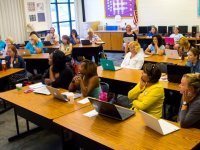How Strong is Your PD Kung Fu?
Consider PD sessions as opportunities to build your toolkit, focus on topics critical to your needs, and use these events to network as well as learn.
Your content has been saved!
Go to My Saved Content.New teachers unfamiliar with professional development might not know that PD can enhance student achievement by as much as 21 percentile points, (PDF) according to a U.S. Department of Education report. But the rewards of these professional learning experiences will be compromised if new teachers don't think and act strategically, as described below.
Don't Expect PD to Have All the Answers
A classroom crowded with interactive fifth grade students is a complex system, just like the weather, the stock market, or (to a lesser degree) chess. In chess, even though each of the 42 pieces is rule-bound, every move and counter move changes the relationships between pieces. Consequently, the number of potential game scenarios is ridiculous -- "so huge that no one will invest the effort to calculate the exact number," writes Jonathan Schaeffer, a computer scientist at the University of Alberta. And just think -- possible classroom interactions are exponentially more complex than chess.
Fortunately, instructors' observations of students provide them with unsurpassed situational awareness of classroom life. It is this very competence that informs two operating principles to adopt during your next PD event.
1. Accept that unpredictability is inherent to classroom life.
No PD consultant can tell you exactly what you need to do in the classroom and how to do it. No strategy or map will tidy up the complex nature of working with students. Therefore, reductively assuming that PD will -- whoosh! -- solve complex classroom problems sets teachers up for disillusionment and frustration.
2. Identify the underlying value of strategies that are presented.
If your PD event presents the jigsaw, don't view this instructional strategy as merely something to plug into a lesson plan in specific cases. At its core, the method leverages cooperation to help students comprehend material through critical thinking and problem solving. Deep understanding of any strategy's function within a discipline enhances your ability to make insightful adaptations when students (predictably) respond unpredictably. Speaking as Captain Obvious: successfully executing an instructional strategy is less important than fulfilling its purpose.
What PD Topics Are Critical in the First Years of Teaching?
If you have a menu of PD topics to select from, sign up for sessions that touch on core concepts, threshold concepts, and bottlenecks. These are defined as follows:
Core Concepts
According to Faculty Focus, "A core concept is a conceptual 'building block' that progresses understanding of the subject." The Common Core State Standards make core concepts easily identifiable.
Bottlenecks
As explained by the Center for Innovative Teaching and Learning, "A bottleneck is a place in a course where, over and over again, large numbers of students fail to learn." For instance, science students often confuse volume and mass. However, scaffolding instruction during a bottleneck reduces cognitive load and allows students to participate successfully with subsequent content.
Threshold Concepts
As described by education specialists Jan Meyer and Ray Land (PDF), threshold concepts are often difficult for students to master. Unlike core concepts and bottlenecks, they profoundly change students' thinking when mastered. James Atherton, in Doceo: Introduction to Threshold Concepts, identifies reading as an example. Once students learn to read, they cannot unlearn the fact that squiggly lines in a book are packed with meaning. Other examples of threshold concepts include the theory of complex numbers, cultural landscapes, multiculturalism, evolution, the state, and gravity.
Before the PD, prepare pedagogical questions for facilitators that relate to bottlenecks, core concepts, and threshold concepts within your discipline, as the answers will be useful to you early in your career.
Connect With Others
Show up early to the PD session and connect with colleagues who are passionate, positive, and professional. Ask them if they have any projects that they're excited about this semester. Building strong relationships with other teachers enriches your professional life and is very strong PD Kung Fu.
Tackle Your "Push Goal" First
Based on each PD session, list ways that you will change your practice, share the list with colleagues, apply the new approaches systematically, collect data, and make necessary modifications. Even better, identify and complete a push goal -- what motivational guru Chalene Johnson defines as one goal on your list that, if achieved, can make many of the others possible. Here's one: engage in at least one positive personal interaction with each of your students every day. If accomplished, this push goal will help accomplish other aims, like improving classroom management and learners' investment in your subject. Says Johnson, "You'll be amazed by how quickly you knock the other goals off your list when you focus on your push goal first."
What to Do When the PD Is a Snooze-O-Rama
Inevitably, you'll attend a PD session where any obvious benefits from being there will escape you. During those disappointing sessions, take the opportunity to reflect on the craft of teaching. Think of it as a problem-solving challenge: How would you make the session stronger if you were in charge?
Finally, remember that we attend PD for the kids. Any event that bolsters classroom instruction serves students' futures, so make your PD experiences count.
How do you make your professional development experiences count? Please tell us about it in the comments section below.
